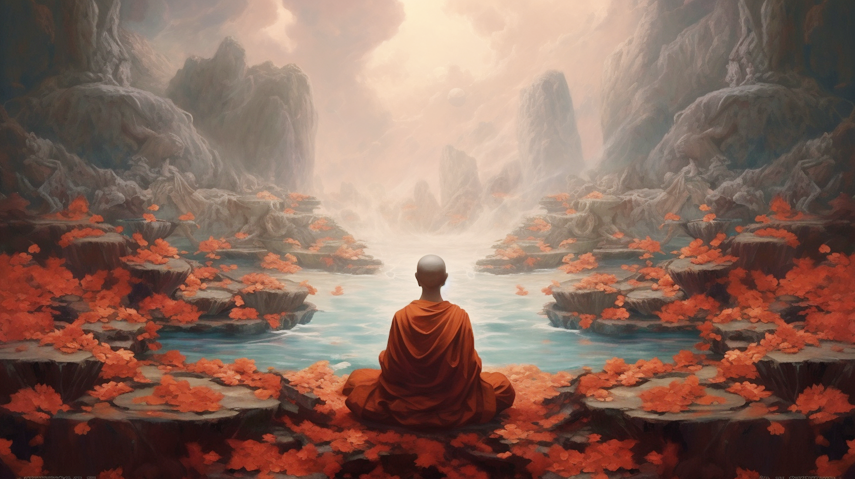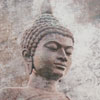Life As Cause And Effect
 by Manly P. Hall
by Manly P. Hall
Forgiveness of Sin Versus Karma
The belief in the doctrine of the forgiveness of sin is entirely inconsistent with a recognition of the immutability of universal law. Either life is a series of fortuitous circumstances dominated by the principle of chance, or the law of consequence bestow upon each that which is merited by previous action. There can be no compromise; the human mind must accept either law or chaos, either pattern or confusion, as the rule of action.
Frequent efforts have been made to blend the doctrine of vicarious atonement with the laws of rebirth and karma. Ingenious explanations have been offered to prove that under certain conditions and for certain people law is tempered by grace. This is only wishful thinking, man’s old theological upbringing overshadowing his philosophical attainments.
It is well within the memory of modern students that various fabricators promised to make man mightier than the Law. It has been erroneously taught that karma might be overcome by breathing through the right nostril, meditating on the kundalini, or supplicating an adept. Various schools of metaphysical philosophy have built up huge followings by assuring human beings without the courage of their convictions that karma can be dissipated with a mantra, and that the whole character and temperament can be reformed by an affirmation.
In most cases only the more gullible have been caught in the nets of deliberate falsehood. Occasionally however an explanation has been advanced so temptingly devised that even the better type of mind has been influenced to disregard the Law and to hold the hope that some angelic hierarchy could wash away the sins and errors of several hundred lives.
When the Oriental doctrine of reincarnation and karma was brought to the West it interested only the most honest and courageous freethinkers. For the majority it was a heretical and insidious doctrine calculated to turn men from the noble truths of Christian orthodoxy. In order to overcome the instinctual prejudices of the nominally Christian laity, an effort was made to effect a compromise. The enthusiastic Orientalist pointed out that Christ and Buddha taught approximately the same doctrines. This viewpoint appeased many, but even these insisted that some pattern be devised by which it could be demonstrated that Christ greatly excelled Buddha. Therefore a world plan was worked out wherein Buddha should be considered as the great teacher of a previous cycle, while Christ was elevated as the master of the present world order. Christians nodded smugly and agreed that this brand of Orientalism was definitely intriguing.
At last the controversy was reduced to the problem of forgiveness versus law. This was the most difficult decision. It was decided that reincarnation and karma were laws governing the fate of ordinary mortals, but that Christ, by virtue of his identity with the Father, could at discretion nullify or change universal law. Karma worked for the common herd, but for the elect there was a dispensation of forgiveness.
The result was hopeless confusion and contradiction. Laws were not laws. There were unexplainable exceptions which plagued the mind as irregular verbs plague the schoolboy. Everything became an exception to everything else. Orientalism disappeared. The old teachings of Pythagoras and Buddha were misinterpreted out of existence. The consequence was a distorted Christian theology ornamented with Eastern terms and some comparatively inconsequential Eastern dogma. Exceptions destroyed the rule.
It is only fair to say that the average enthusiastic believer sensed no contradiction between vicarious atonement and reincarnation and karma. Understanding neither doctrine, he could accept both. The result has been a great number of compromise cults which teach a little of everything and not much of anything.
The first rule that the Oriental disciple learns is that the Law has no exceptions; that neither god nor man can deflect its course in any way. The Law preceded the gods and it will remain after all living things have vanished. The Law abides in space; it governs the motion of space; it forms, maintains, and dissolves the world. The Law is not regarded as something to be feared or escaped, but rather the true hope and security of the wise. As surely as the Law punishes inadequacy, so surely it rewards adequacy. The man who lives by the Law need fear no other man nor his own ultimate fate. The Law both punishes and protects. It is the ever present cause of progress.
The saints, sages, and world teachers are not exceptions to the Law with power to change or modify its course. They are the product of such laws as evolution, reincarnation, and karma. The integrity of his thought and action elevates the world teacher to the chief place among men, and establishes him as an instructor of the rest. He is firmly supported by universal law, and manifests it in every thought, word, and action.
The laws of nature are scarcely the subject upon which elaborate theologies can be built. The doctrine of individual integrity is fatal to organized systems of religion. Therefore, early in the history of faiths, the priestcrafts began the process of making their followers theology conscious. Right and wrong were no longer right and wrong. Prayers and offerings, especially offerings became the requisites of salvation. The result of such notions was ecclesiasticism. The priest or the preacher became the intermediary capable of bestowing divine blessing or forgiving human sin. The Law vanished and the despotism of dogma took its place.
The student of reincarnation and karma must realize once and for all there can be no exceptions of any kind, or for any reason, to the laws of evolution, reincarnation, and karma. Anyone who teaches an exception teaches a false doctrine. As the Buddhist monk says: “There is no refuge but the Law.” Reincarnation and karma are the religious teachings of the New Age. They are individual in their application, but utterly universal in their scope. There is no need of a priestcraft with its concept of special privilege. Reincarnation and karma are merely mental and spiritual honesty applied to the process of living.
It is regrettable to find that a number of sincere Orientalists have been deceived by the curious mixture of Eastern and Western teachings known as “popular Orientalism.” Very few legitimate teachers of Eastern mysticism have ever come to the West. We have comparatively little knowledge of real Oriental doctrines, and never has it proved more true that “a little knowledge is a dangerous thing.” The intelligent Oriental is shocked, horrified, and amused by the misinterpretation of his beliefs which flourish in our Western world. To him it is incredible that any people should be gullible enough to accept as bona fide such obviously ridiculous teachings.
The Asiatic is trained from childhood to believe in law. His earliest actions are a conscious dedication to the universal pattern of law and truth. Those who accept reincarnation and karma as rule by which to live should accept them utterly and without compromise. They should live in the Law, recognizing the exactitude of the Law as the one sure and inevitable fact which man is capable of knowing. In a universe of unknown mysteries, reincarnation and karma stand out as knowable and usable.
The honest man approaches these laws with complete acceptance. He desires no escape from the consequences of his own actions. He expects no liberation apart from self-perfection. He may even acknowledge that he does not know what perfection is, but realizes that the Law will ultimately bring to him the knowledge of all that is knowable, the highest achievement of which man is capable.
It is proper and right that those who believe in reincarnation and karma should make it the absolute rule of personal conduct. They should perform only such actions as they are willing to accept as consequence. They should evade no consequences which they realize are the results of personal karma. Nothing else is necessary. We require no heaven or hell, no gods or demons. Life is the living out of cause and effect, each cause producing an effect commensurate with itself; each effect in turn setting new causes in motion. When the theory of evolution is added to this picture we can recognize eternal growth toward Reality. Every experience becomes a part of knowledge. We can live impersonally, comforted by the truth of eternal progress.
Reincarnation and karma, if compromised in any way by the belief in mitigating circumstances, or interfered with in any way by the whims or pleasure of the gods, would immediately cease to be laws.
 Disciplines Of Liberation (Please note: The use of the word “entity” could be identified as the Higher Self here)
Disciplines Of Liberation (Please note: The use of the word “entity” could be identified as the Higher Self here)
Reincarnation as a belief extends the horizon of existence to include numerous embodiments under a wide diversity of circumstances. The psychology of reincarnation is very different from the one-life belief that dominates the West. In one life so little can actually be accomplished; so large a part of hopes and ideals can never be realized. The Western thinker is limited to the narrow space of “three score years and ten.” In this hopelessly inadequate time he must “live, move, and have his being.” In this cramped interval he must prepare for an eternal hereafter. It is no wonder, then, that material theories, the products of scientific skepticism, are accepted as a welcome escape from the hopelessness of prevailing religious beliefs.
Some skeptics criticize the Asiatic for his belief in many lives. They maintain that it results in indolence and indifference in matters of the present existence; that it is a philosophy of procrastination and evasion; wishful thinking for better states to come. This is not a fair criticism because the believer in reincarnation insists that his future existences depend upon his present integrity. Therefore reincarnation is a stimulus to right action, but not necessarily a stimulus to acquisitiveness.
It is inevitable that the belief in reincarnation and karma should result in the development of a method by which the workings of these laws should be expedited. In the East there are numerous philosophical orders which teach the individual how to gain the most in experience and knowledge from the doctrine of compensation and the plurality of lives. Where physical life is merely a passing incident in a larger pattern made up of numerous lives, the attitude toward living is different, less intense, less personal, less possessive and more detached. There is also a higher idealism. Much more can be accomplished in several lives than in one. Therefore the goal of living is further removed from the present than in a philosophy which teaches a single existence.
The reincarnationist does not believe in haste, stress or strain. It is the quality of accomplishment and not the rapidity of it that concerns such a mind. Whereas the West is ever hurrying though it knows not where it goes, the East proceeds slowly exploring every detail of life. It has time to linger on its way. Two Chinese scholars will sip their tea by the hour, indifferent to the haste about them. For these scholars there is time for gentle conversation, for the study of art, for the admiring of a fine painting, and for the innumerable small formalities of the Confucian code. In the same way the Buddhist abbot in his saffron-colored robe spends hours pruning his wistaria or throwing crumbs to the golden carp in the monastery pool. The temptation to achieve at the expense of other men is gone. The haste to use up what little of life remains has no place among those who understand the Law.
The yogi in meditation in his cave at the headwaters of the Jumna, or the Persian Sufi illuminating manuscripts by the light of a single oil lamp, fulfills the promise of his years, each in his own way enriched by the belief in a continuity of existences.
Reincarnation is a belief that corrects not only the concept of incessant striving, but the illusional achievements toward which this striving is directed are shown in their true unreality. There is no desire to be great as men know greatness; no mad questing after power or position. Instead there is the remembrance of the Buddha’s words: “Who lives a prince may come again in rags.” Merit lies not in commanding and controlling other men, but in a kind and gentle victory over self. The uselessness of position and possessions which cannot survive the dissolution of the flesh inclines the mind to temperate courses in a world of excesses and extremes.
The true understanding of karma solves, as we already have shown, the whole mystery of egotism. It is not the illusional self that goes on after the dissolution of the fleshly part; therefore the whims, desires, and appetites of the personality are of little consequence. They are not even important enough to be called good or evil. Conscious immortality is no desire of the Eastern mind. Therefore during life there is no resistance to those innumerable circumstances which normally would offend the ego. When the Westerner is reminded of his insignificance he is angry and resentful. But the Easterner, knowing truly how little he is, is not offended by criticism, but acknowledging all the faults of which he is suspected realizes that only lives, many lives, can correct them all.
The fear of death is the great delusion of the Occident [Westerner]. As the time of physical dissolution approaches both the living and the dying unite in common panic. Then comes the funeral, with weeping relatives sobbing over beloved remains; then empty years in which the memory of the one who has gone dominates all that concerns the daily existence of those who are left behind.
This miserable picture is not possible when the doctrines of reincarnation and karma are actually believed. Death is not the end of anything except a personality that in a certain sense is never actually real, being merely a shadow cast in matter by an immortal being who lives all the lives of the personalities which it creates. The Eastern mystic views the Christian concept of immortality with the utmost dread. Nothing could be more horrible than going on forever, always remembering, always desiring, always repenting.
Reincarnation and karma also clarify such matters as physical relationships, of father and son, of mother and daughter, of brother and sister, and of husband and wife. To the Buddhist, all associational relationships are temporary and illusional. There is no such thing as blood relationship; there are merely personalities living through the dream of relationship in order that certain experiences may be gained. The permanent entities above are complete in themselves; the personalities which they emanate merely appear to be related to each other. Relationship is but the privilege of association for the purpose of growth and the opportunity to learn new lessons and to approach a little nearer the mystery of understanding.
In substance, then, the belief in rebirth and compensation changes the entire viewpoint, enriches it, normalizes it, frees it for action, and removes forever the theological bugaboo of perdition.
The purpose of all evolution is to achieve liberation; that is, to produce a personality into which the entity flows so perfectly and completely that there ceases to be any interval between the two. To achieve this end requires the disciplining of the personality. This discipline is made possible only because previous lives have enriched the new personality with sufficient wisdom to desire this discipline. Until that time is reached the personality is incapable of achieving liberation.
Liberation as taught in the East must never be confused with the absolutism of modern metaphysics. True liberation is the withdrawal of the personality; the end of the illusion of “I-ness”; the consummation of hundreds of lives of gradual evolution toward reality. It is not the product of will power, meditation, concentration or any of these exercises which are advocated as substitutes for personal experience and action. Man cannot think himself, will himself, or hope himself into the state of true enlightenment. Liberation results from the elevation and refinement of personalities through thousands of years of rebirth, with the result that at last a personality is emanated which is capable of making the supreme adjustment in which it absolutely negates itself to the entity from which it emanates.
This negation is not a psychical thing, nor is it a Christian humility, nor again an inhibition as in the case of the evangelized personality who is constantly recounting his sins. Liberation is a perfect and complete adjustment in which all of the parts of the personality are in perfect rapport with the entity itself. The result is adeptship and liberation from the wheel of personality rebirth.
The average student of philosophy is not going to accomplish liberation in the present life. There are more than two (now seven) billion personalities on the earth today, and of those now living, it is unlikely that more than three will accomplish liberation in their present incarnation. These three will have been faithful chelas of great masters for several lives.
It should be remembered that it is not necessary to attain the ultimate illumination, such as that reached by Gautama Buddha, in order to live well and happily through the years of the present personality. Everyone could live better than he does. Each could make a definite step forward, bringing with it added security and happiness, if he would live according to the Law. In the East the acceptance of reincarnation and karma is the first conscious step on the long road that leads to reality. These laws are part of the esoteric teaching of every legitimate world religion, and the acceptance of them is essential to entry upon the path.
After the student has committed himself to the doctrines of rebirth and karma he must begin to live the gentle, impersonal life that must accompany this commitment. Now comes the greatest point of danger. Having discovered a part of truth, but still partaking of considerable ignorance, the mind has a tendency to go off on tangents and to concoct innumerable erroneous beliefs relating to the subject. This has been the common calamity in the West. A phase of this mistake is indifference to the misfortunes of others. The attitude becomes one of “they have earned it so let them suffer it.” This is not healthy. No matter how wise we may become, or how stupid others may appear to be, it is the duty of the disciple to assist the uninformed in any way possible.
Another phase is an intolerance toward people of other beliefs and a sense of personal superiority. Such attitudes destroy the improvement that has been gained, and the next personality sent out by the entity will probably be deprived of the knowledge of rebirth.
For the student just coming into the belief in rebirth and karma, or slightly advanced in the doctrine, certain suggestions may be in order. In the first place, live normally and happily. Prove that knowledge has increased tolerance and understanding, and not limited them. Balance the temperament, advancing simultaneously along several lines of accomplishment if possible. Do not become improvident, but realize that when the time comes for you to be free from physical responsibilities the entity will free you. Do not attempt virtues beyond your understanding simply because others tell about them. Do not aim at immediate emancipation or you will be sorely disappointed. Apply your beliefs to the circumstances affecting your life, and make sure that they work when they differ from your personal preferences. Teach them to others, but never force them upon a person who does not desire the knowledge of these laws. Do not permit impersonality to chill or harden your life, or permit yourself to become indifferent to social or environmental problems. Live what you believe, but make sure that you actually believe what you live. If you do there will be no conflict, and in a few hundred more lives you will achieve liberation normally and beautifully.
Excerpt from Reincarnation: The Cycle Of Necessity
Posted in Other Topics, Reincarnation, Spiritualitywith comments disabled.





